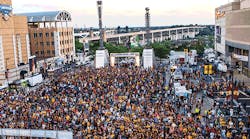Cleveland, Ohio is known in the sports world as a town of heartbreak.
To me, Cleveland is home.
I grew up near the city, left for college and to start my journalism career and moved back three years ago. I love this city and its Rust Belt charm. I love its people and their Midwest values. I love its sports teams, against the odds.
As a sports fan and a Cleveland native, I know the stories well: The Drive, The Fumble, The Move, The Decision. All of these tales of misfortune culminate in one sobering statistic: the city hasn't won a championship in 50 years. We are the perpetual underdog story minus the feel-good ending.
This year, as the Cleveland Cavaliers made their way into the NBA playoffs, it felt like finally the Cleveland Curse would be lifted. We had an all-star cast ready to dribble their way to victory: LeBron James had returned home and, paired with Kyrie Irving and Kevin Love, was determined to bring that longed for final win to Cleveland.
But then Love went down with a shoulder injury in the opening round of the playoffs, effectively ending his season. Less than two months later, Irving's already weakened knee gave out in overtime against the Golden State Warriors in the first game of the finals, sidelining him, too.
It was heartbreaking; it felt like the whirlwind season of wine and gold was ending as Irving limped off the floor.
Somehow, the Cavs managed to fight their way through to Game 6 of the Finals, but the injury-laden team in the end couldn't overcome the Warriors.
It was a hard loss to take in Cleveland, a city beleaguered by half a century of sports disappointment. A team arguably on the brink of historical greatness never got the chance to see what it was capable of; unforeseen injuries stopped it short.
The same can be said about the factory floor, the construction site or the office.
Without question, injuries are hard on a company. They are expensive; the cost of downtime, medical expenses and operational fixes takes its toll. But, what's more, they impact the team.
Just as the Cavaliers were unable to truly see if they had what it took to win the ultimate prize in their arena, a company likewise is unable to achieve its best when all of its employees aren't healthy or operating at 100 percent.
Injuries put additional strain on other workers; they force others to take on more work or to fill positions with which they are uncomfortable.
Driving home recently from Cincinnati, I passed a Shaffer Trucking 18-wheeler with the following phrase in block letters on the back of the trailer: Our most valuable resource sits 63 feet ahead.
Certainly, there's something to be said about resilience and working hard despite challenges, or "overcoming adversity" as players are wont to say in post-game interviews.
In Cleveland, we are not a heartbroken city after this Finals loss. We saw the Cavs give "grit," as the Plain Dealer wrote the day after the final loss; we saw unsuspecting players become household names, giving to the game more than had ever before been asked of them; we saw a team truly giving its all. It was invigorating to see the true reach of human ability and drive.
But, in the end, despite their efforts, the Cavaliers couldn't clinch the championship. They were too tired; they were stretched too thin; they couldn't weather the frenetic race to the finish line.
Sure, workers can do more, can take on new jobs, can work harder, but at what cost? And for how long? Eventually, there comes a breaking point.
Preventing injuries in the workplace – making safety a priority – not only protects the potentially injured worker, but also the team. It makes anything possible, even in a place that has seen its share of misfortune.
Send an e-mail with your thoughts to [email protected].
